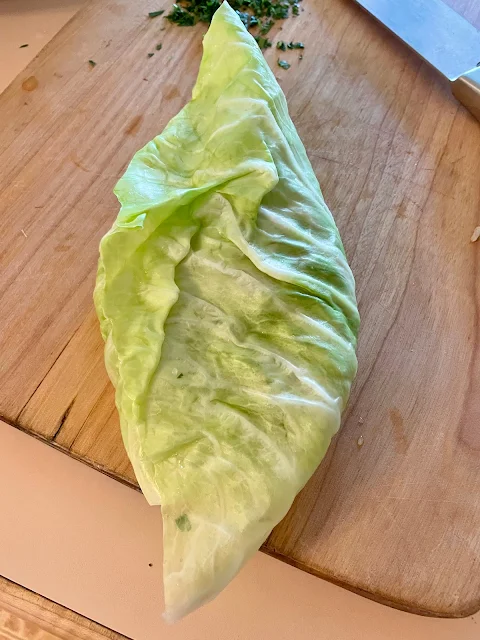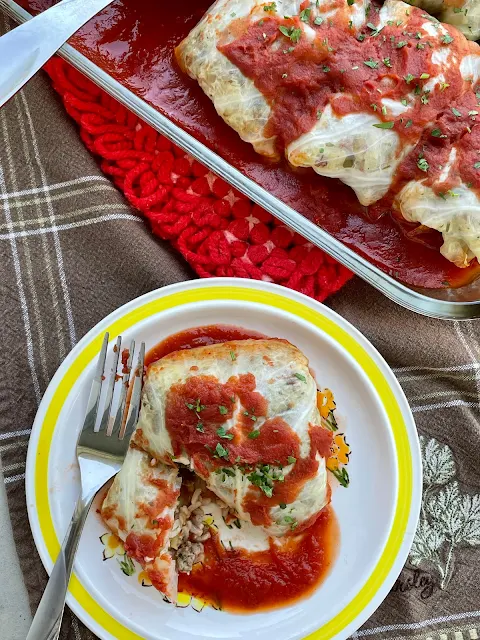Galumpki are a hearty and delicious meal to make during cabbage season. These are a family tradition and a family recipe that we've enjoyed for years.
Posts may contain affiliate links. If you purchase an item from these links, a small percentage goes to support the work of this blog. As an Amazon Associate I earn from qualifying purchases.
As cooler weather begins, heartier dishes start to hit the weekly menu more frequently. These Galumpki, also know as cabbage rolls, are a perfect meal for the transition from summer to autumn.
This recipe comes from my husband's grandparent's old cookbook. Similarly to his recipe for hot dog sauce, this Galumpki recipe was found handwritten on a small scrap of paper. There were not many measurements listed on the paper; just the ingredients and some basic instructions.
We've made these many times over the years since finding that scrap of paper, and we think we have the recipe down to tasting as we remember it. I like making these old family recipes, especially for my kids to try to carry on the tradition.
How to remove leaves from a head of cabbage
The first thing you need to do to remove some large cabbage leaves from a head of cabbage. This can be tricky to do without ripping them, and you want them to be as intact as possible for stuffing and rolling.
Some people recommend sticking the entire head of cabbage into a pot of boiling water. I've never tried this and, to me, it seems difficult and I'd be afraid of dropping it while getting it in and out and/or splashing myself with boiling water. Here's what I do instead.
First I turn the head of cabbage upside down with the core facing up. I locate the outer-most leaf (after removing any leaves that have holes, are a bit browned or ripped).
I use a shape knife and cut through the bottom thick rib part of the leaf near the core. Cut only deep enough so that particular leaf can be removed without cutting into another.
Then, I carefully make sure the leaf has been fully cut off and slowly begin to peel it off the head starting from the core. I find this works much better than trying to start at the top and the thinner part of the leaf.
Repeat this process until you have 10 large cabbage leaves. I like to cut out a small triangle at the bottom of each leaf (see photo below), where the rib is the thickest so they are easier to lie flat and fold.
How to make Galumpki (cabbage rolls)
Then rinse the leaves and follow the directions to parboil them (found in the recipe card below).
Once you make the filling, prepare the baking dish, and have your parboiled cabbage leaves, it's time to stuff and roll the cabbage.
Place about 1/3 to 1/2 cup of the filling into the middle part of the leaf. The amount of filling varies depending on the size of the cabbage leaves.
Fold over the sides of the leaf toward the center, one at a time. Try to get them relatively tight, without pushing out any filling.
Then, start at the bottom and roll it up as tightly as you are able without squeezing out the filling and trying to be careful to not damage the leaves.
When they are rolled up, place them into the prepared baking dish, seam side down, and repeat until all the filling has been used.
Once they are all in the dish, top them as evenly as you are able with the remaining tomato sauce. Then cover the baking dish with foil to bake. They will bake for about 45-55 minutes until they are hot and tender.
These Galumpki do take some time to put together, but they are worth it for me to make once or twice a year. They also freeze well.
I like to make them and put them into a disposable aluminum baking dish instead of a glass dish. I follow all the steps until baking them in the oven.
Wrap them up well in foil and freeze. Thaw them out overnight when you want to eat them. Bake as you normally would (it may take a little longer to get them fully hot this way).
Serve Galumpki with your favorite garlic bread, rolls, or a loaf of crusty bread with butter for a delicious family dinner. They are a great late summer and early autumn meal when cabbage is in season.

Galumpki (Cabbage Rolls)
Ingredients
- approximately 10 large, tender cabbage leaves
- olive oil for cooking
- 1 lb ground beef
- 1 medium onion, finely diced
- 2 cloves garlic, minced
- 1-1/2 tablespoons Worcestershire sauce
- 1 cup white rice, cooked to package directions
- salt and fresh cracked black pepper, to taste
- 2 tablespoons minced parsley, divided
- 16 oz. can tomato sauce
Instructions
- Remove the damaged outer/tough leaves from the cabbage. Carefully remove ten large cabbage leaves, trying not to rip them.
- Using a knife, cut out the thickest part of the rib on each leaf in a triangular shape. Rinse and then parboil the leaves.
- In a large deep pot, heat water until boiling. When it's boiling add the cabbage leaves (a few at a time) and cook for about 3-5 minutes, just until they are softened. Remove from the water and set aside. Repeat until all leaves are parboiled.
- While you are doing the cabbage, put the rice on to cook, according to package directions.
- In a large skillet, warm about 1 tablespoon of olive oil over medium heat. Add the ground beef and cook, while breaking apart, until it's almost cooked through. Add the onion and cook until translucent. Season the salt and pepper.
- Drain any fat from the beef, if needed.
- Add the garlic and Worcestershire sauce. Stir and cook for another minute.
- Stir in the cooked rice. Taste and season with salt and pepper as needed. Stir in one tablespoon of parsley.
- Preheat the oven to 375 degrees. Spray an 11" x 14" baking dish with cooking spray. Spread a couple of tablespoons of tomato sauce on the bottom of the dish.
- Take each cabbage leaf and place about 1/3 to 1/2 cup of the mixture inside (use your judgement to get a good ratio of cabbage to filling - this will depend on the leaf size).
- Fold over each side the long way. Then, starting at the bottom, roll up and then place in the baking dish. Continue until all the mixture is used. You may not use all the leaves.
- Top with the remaining tomato sauce. Cover with foil and place in the oven.
- Bake for approximately 45-55 minutes, or until the leaves are fork tender and the sauce is bubbling.
- Top with the remaining parsley and then serve.
I hope you give these Galumpkis a try! Let me know in the comments below.
Don't forget to follow me on Instagram, Facebook, and Pinterest!
This post was originally published in 2011 and has been updated in 2023 with a recipe card, new photos, new text, and more to improve reader experience.
Check out these other cabbage recipes:
Braised Red Cabbage w/ Cranberries & Maple












How cool to find an old family recipe! I made a vegetarian version of stuffed cabbage rolls a while ago, but today I have some ground beef in the fridge, and these look tempting!
ReplyDeleteLooks delicious! We call these cabbage rolls, but I guess they kinda are like pigs in a blanket, especially if you used some pork in the filling!
ReplyDeleteI've never come across the term galumpkis before thought I'm very much familiar with pigs in a blanket. Lucky you to have come across a traditional family recipes. Looks yummy!
ReplyDeleteThanks everyone. I was glad to find this old recipe, too.
ReplyDelete